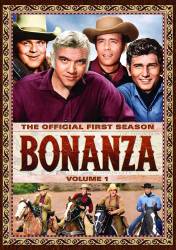Factual error: Samuel Clemens, who has written several humorous tales for the Territorial Enterprise, tells the publisher he would like to start writing serious news stories. The publisher replies, "This is a newspaper, not a comic strip. You write it and I'll print it." The first comic strip, "The Little Bears," debuted in 1893 and the term "comic strip" did not enter the vocabulary until 1920. "Bonanza" is set in the 1860s.
Factual error: Joe Cartwright gives a Raggedy Ann doll to a young woman named Annie. "Bonanza" is set in the late 1860s. The Raggedy Ann character was created by Johnny Gruelle in 1915.
Factual error: "Bonanza" is set in the 1880s. In this episode, Little Joe and a friend discover a site where a man and his wife and daughters were attacked by Apaches. A Raggedy Ann doll is among the rubble. Johnny Gruelle did not create the Raggedy Ann character until 1915.
Factual error: In a flashback episode set in the 1840s, Ben Cartwright and his former Captain are operating a ship's chandler business. A competitor accuses them of running a "flea market." That term is a translation of the French "marché aux puces" and did not enter the English language until 1922.
Factual error: Walter Prescott accuses Hoss of "two-timing" him with a mail-order bride. This episode is set in the mid-1860s and, according to the Merriam-Webster dictionary, the expression "two-timing" dates from 1924.
Factual error: This episode is set in 1861. A little girl, Peggy Dayton, has a Raggedy Ann doll. Johnny Gruelle did not create the Raggedy Ann character until 1915.
Thanks for Everything, Friend - S6-E4
Factual error: Adam has fallen into the river. As he is spotted by Tom Wilson from his campsite, a car is visible passing far across the valley.
Found Child - S7-E7
Factual error: The episode opens with Hoss discovering a wrecked wagon with three dead adults. He spots a Raggety Ann doll and realises that a child may be nearby. Raggety Ann dolls weren't invented until 1915, at least 48 years after the shows time frame.
Ride the Wind: Part 1 - S7-E17
Factual error: "Bonanza" is set in the 1860s and the Pony Express mail service operated from 1860 to 1861. In this episode, Curtis Wade and his partner set up a Pony Express office in Virginia City and begin hiring riders. Wade tells them that the job will not be easy, adding, "I won't be giving you sweet cakes and cotton candy." Cotton candy, originally called "Fairy Floss," was invented in 1897 by William Morrison and John Wharton.
The Unwritten Commandment - S7-E28
Factual error: Wayne Newton sang "Scarlet Ribbons." "Scarlet Ribbons" wasn't written until 1949. The TV show Bonanza was set in the 1860s.
Factual error: About half-way through the show, Joe Cartwright states 47 people received The Medal of Honor in the Civil War. In reality there were 1522 recipients of The Medal in the Civil War. While an honor to receive, it wasn't held to quite the same level as in WWI and beyond.
Factual error: The wife of a former Civil War general who is being encouraged to run for Governor tells Ben Cartwright, "He's used to being in The Spotlight." This series is set in the 1880s and the word "spotlight" did not enter the English language until 1904.
Factual error: As the boy dies, his hand opens and coins roll out. Included are Washington Quarters (first made 1932), Jefferson Nickels (1938), and Roosevelt Dimes (1946). (00:15:45)





